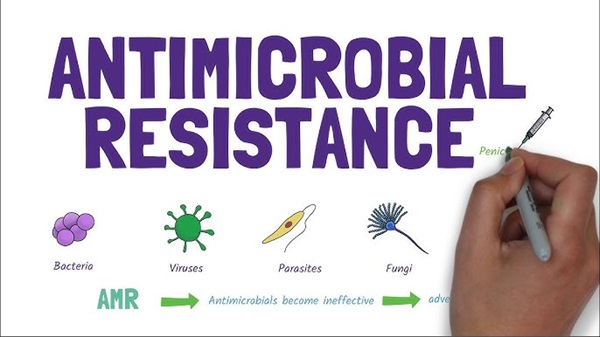
Nigeria has officially launched its comprehensive roadmap to host the 5th Global Ministerial Conference on Antimicrobial Resistance (AMR) in 2026, marking a pivotal moment in Africa’s leadership on the global health agenda.
This strategic move includes the activation of a multi-layered governance structure, the formation of specialised subcommittees, and a coordinated call for domestic and international support to ensure a successful event.
The director-general of the Nigeria Centre for Disease Control and Prevention (NCDC), Dr. Jide Idris made this known on Monday in Abuja during the inauguration of the ministerial advisory committee for the conference. Idris emphasised that the timeline is tight, with just over a year remaining before Nigeria hosts what will be the first AMR Ministerial Conference ever held on African soil.
“This event should have commenced weeks ago, but we are pleased that the process is now in motion,” he said. “The task ahead is enormous. We must deliver a world-class conference that not only amplifies Nigeria’s leadership but also positions African voices at the forefront of the global AMR discourse.”
To manage the scope of preparations, Nigeria has established a four-tier governance structure. At the apex sits the high-level ministerial advisory committee comprising ministers from the health, environment and agriculture sectors, alongside other senior government representatives. Beneath this is the steering committee, chaired by the director of public health, which oversees the operational and strategic rollout of conference plans. Functional subcommittees covering programme and content, partnerships and resource mobilisation, logistics and operations, as well as communications and publicity are also fully constituted and active.
According to Idris, planning and execution will follow the One Health framework – an integrated approach that recognises the interdependence of human, animal and environmental health. This structure, he said, is essential for tackling AMR effectively and will guide the planning from start to finish.
He disclosed that the subcommittee stage is expected to conclude by the end of August 2025, with full programme design and budget finalisation due before December 2025.
Notable milestones already in progress include the confirmation of the ‘Transport’ building in Abuja as the conference venue, selection of global keynote speakers, and development of the Abuja Outcome Document.
Nigeria is also maintaining ongoing coordination with key global stakeholders, including the World Health Organisation (WHO), Food and Agriculture Organisation (FAO), United Nations Environment Programme (UNEP) and the World Organisation for Animal Health (WOAH).
“We’re studying the experiences of past hosts like Saudi Arabia, Oman and the UK. Kenya’s logistical challenges taught us that thorough coordination is critical. Our process will be better because we are building around One Health from the beginning,” Idris said.
He called on ministers across Africa and globally to reach out to their counterparts to ensure strong country representation. “This cannot be a one-country effort. AMR knows no borders. We are urging all ministers – health, agriculture, and environment – to rally support at home and abroad.”
Idris also outlined Nigeria’s core priorities for the conference, which include equitable access to antimicrobials and diagnostics, technology-driven AMR surveillance and stewardship, sustainable financing, infection prevention and control (including WASH) and youth leadership in AMR advocacy.
“These focus areas will be embedded into each session and into the final outcomes of the conference,” he said. He also urged the ministerial advisory committee to approve a global press release announcing the official dates of the 2026 conference. This, he said, would signal the start of global mobilisation, logistics coordination, and high-level engagement.
Meanwhile, the Minister of State for Health and Social Welfare, Dr. Iziaq Salako noted the international attention Nigeria’s hosting has attracted. “At the UK-Africa Health Summit, and even at the World Health Assembly, this conference was a hot topic. People are watching. The global community expects a lot from Nigeria.”
Salako emphasised the critical role of the advisory committee in delivering a world-class event. “We are not just representing ourselves; we are projecting the image of Nigeria on the world stage. This is a historic opportunity to shape the global AMR agenda from an African perspective.”
He noted that the conference will convene a diverse group of global health leaders, policymakers, researchers, private sector actors, and civil society organisations to mobilise urgent action against AMR, which he described as one of the gravest public health threats of the century.
Science Nigeria reports that the Federal Government has pledged regular updates and transparency throughout the planning process. It has also opened channels with corporate entities, development partners and the National Assembly to mobilise financial and technical support.
As Nigeria advances its second National Action Plan on AMR (NAP 2.0), experts warn that failing to involve the private sector, particularly in areas of human, animal, and environmental health, will undermine progress. With over 60 per cent of healthcare services delivered by the private sector, strategic inclusion is key.
Antimicrobial resistance occurs when bacteria, viruses, fungi, and parasites evolve to resist treatment, making common infections harder or impossible to cure. AMR led to over 263,000 deaths in Nigeria in 2019, more than the combined toll of malaria and tuberculosis.
Key drivers of AMR include the overuse of antibiotics in human and animal populations, poor infection control, weak enforcement of pharmaceutical regulations and rampant self-medication.
Experts say only a holistic One Health strategy – one that integrates human, animal, and environmental health sectors – can stem the tide of AMR. Nigeria’s 2026 AMR Ministerial Conference is shaping up to be a defining moment in this global fight.

